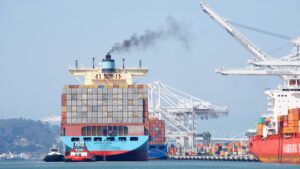Regulating and Reforming De Minimis
On October 9, WITA hosted an expert panel to discuss the Biden-Harris Administration’s new measures related to de minimis shipments to the United States, including from online marketplaces. Panelists discussed the White House proposals, its use of executive authorities to address this issue, and proposed legislation.
Featured Speakers:
Ralph Carter, Staff Vice President, Regulatory Affairs, FedEx
Kim Glas, President & CEO, National Council of Textile Organizations; Commissioner, U.S.-China Economic and Security Review Commission
Melissa Irmen, Director of Advocacy, NAFTZ-National Association of Foreign-Trade Zones
John Pickel, Senior Director, International Supply Chain Policy, National Foreign Trade Council
Felicia Pullam, Executive Director, Office of Trade Relations, U.S. Customs and Border Protection
Moderator: Ana Swanson, Trade and International Economics Reporter, The New York Times
10/09/2024 | WITA
Closing the Gap Between Mars and Venus on Trade
On Thursday, October 31, WITA will host Daniel Mullaney on a panel on US-EU Trade & Investment, as part of its hybrid event, The Future of U.S.-EU Trade and Investment. Learn more here.
The bottom line
In early 2025, a new US administration and European Commission will be in place. It will then be more critical than ever that the United States and the European Union (EU) coordinate their approaches to international trade across a wide range of issues. A significant impediment to this coordination is the persistent temptation—by a range of players in transatlantic circles—to articulate and emphasize supposedly fundamental differences between Washington and Brussels in a way that highlights the virtues of one and denigrates the other. As satisfying as that classic conflict narrative is, it has real-world negative consequences for both parties and should be reassessed by all players in favor of the reality that what unites the United States and the EU dwarfs their differences.
State of play and the strategic imperative
Leading into 2025, cascading joint challenges of supply chain vulnerabilities, climate change, deindustrialization, competitiveness, geopolitical crises, and damaging third-country non-market economy policies and practices—coupled with an international rules system designed for another era—will increasingly drive both sides to use unilateral measures to protect and achieve legitimate policy goals. The US tariffs on steel and aluminum and the Inflation Reduction Act are two such examples; the EU Carbon Border Adjustment Mechanism (CBAM) and Deforestation Regulation are two others. Other measures risking transatlantic friction include the EU’s Corporate Sustainability Reporting Directive, the longstanding Boeing-Airbus subsidies dispute, previous tensions over the EU digital services tax, a failure to reach a critical minerals agreement, and US companies’ compliance with the EU’s Digital Markets Act.
The current trend is not abating. Unless the United States and the EU cooperate on those unilateral measures, there is a high risk that they will result in significant bilateral trade clashes. At a minimum, this will undermine achieving generally shared goals; at worst, it could result in spiraling bilateral trade retaliation.
A significant barrier to transatlantic trade cooperation is the persistent underlying narrative—among policymakers, think tankers, and others—that the United States and the EU approach the world from fundamentally different perspectives. In the memorable words of a distinguished commentator twenty years ago, the United States is from Mars, and the EU is from Venus. This can be an attractive narrative, as it allows each to claim virtues that the other supposedly lacks. It allows Washington to take pride that it is tougher and more clear-eyed than a feckless EU; it allows Brussels to claim that it is more law-abiding and multilateral than the “Wild West” United States.
But this narrative is a choice, not a fact. And the strong inclination to triumphantly celebrate supposed fundamental differences has negative real-world impacts. This narrative finds its way into public statements, is sometimes amplified by a press happy to report on big-picture fights, and can end up deeply embedded in the public consciousness, determining whether or not there is public support for US-EU cooperation. And this narrative of fundamental differences between the United States and the EU—each side claiming the higher virtue—undermines US-EU cooperation.
10/07/2024 | L. Daniel Mullaney | Atlantic Council
Rethinking Economic Structure: Dreams, Nightmares, and Threats
The following piece includes excerpts from Angus Deaton’s article, Rethinking Economic Structure: Dreams, Nightmares, and Threats.
Globalization and trade
The benefits of globalization have not been equally distributed. The effects of trade on jobs have been particularly controversial. The losses of jobs have been well documented, especially through exposure to China which accounted for perhaps 2 million lost jobs. Standard economic analysis— the benefits to trade are almost a sine qua non to qualify as an economist—argues that lower tariffs are always in the (net) national interest, with consumers benefiting from lower prices, and new jobs created among exporters to replace those lost by industries exposed to trade. It is also noted that many of the manufacturing jobs that were lost were doomed in any case, and that more jobs were lost to automation than to trade. Beyond that, there is job churn in the US with many jobs lost and gained every year, as many as 2 to 3 million a month, relative to which even 2 million jobs lost over a decade or so is very small. Jobs must be reallocated over time to maintain efficiency and the defenders argue that, rather than preserving jobs through tariffs, the individuals and communities should be compensated for the closures but closed just the same.
But there are good arguments on the other side. When tariffs are already low, the net gains are smaller than the gross gains and losses, so there is a very large amount of disruption—gainers and losers—for a relatively small net gain. Under such circumstances, trade deals disrupt society for ever smaller net gains. The economic accounting, in terms of income gains and losses, is seriously incomplete because much of the trade not only destroyed jobs, but whole communities. Communities are necessary for people to flourish, and, along with meaningful work, are the loci of what John Rawls called the social bases of self-respect. My argument here is that, at least some of the morbidity and mortality among working Americans must be attributed to trade, something that is not considered in the income-based calculations, and which would not likely be eliminated by compensating the losers in money, not something that tends to happen in any case.
Obviously, there are trade-offs here; no one should argue manufacturing employment can be restored to its previous levels, but it is surely possible to do better calculations for future trade deals. Note too that trade weakens the bargaining position of trade unions and of labor relative to management. The absence of private sector unions means that workers have less say about the direction of technical change and automation than once was the case; history shows that who benefits from technical change depends on how it is implemented, and that the nature of the implementation has always depended on relative power. Finally, I note that democracies are supposed to involve those who are affected in decision-making, something that has been notably absent in recent trade arrangements especially as unions have declined. Globalization and the construction of international rule-making bodies moves decision-making offshore, further weakening national and local democracy. Not content with their domestic rent-seeking, corporations, their lobbyists, and lawyers have become increasingly dominant in US trade negotiations, often bringing harms to people in weaker partner countries around the world.
06/24/2024 | Angus Deaton | Princeton University
Waging a Global Trade War Alone: The Cost of Blanket Tariffs on Friend and Foe
The following piece includes excerpts from Edward J. Balistreri & Christine McDaniel’s article, Waging a Global Trade War Alone: The Cost of Blanket Tariffs on Friend and Foe.
For good or bad, not all campaign rhetoric converts to policy once it is examined systematically. We consider a 2024 presidential campaign proposal to escalate US tariffs against all trade partners, with exceptionally high tariffs on Chinese goods. With inevitable retaliation, this creates a trade siege of “fortress America,” which disadvantages US exports around the world in favor of trade from other countries. US tariff escalation creates a lucrative set of opportunities for everyone else. For instance, many US manufactured goods would exit European markets as Chinese goods enter, and European consumers and Chinese manufacturers benefit at the expense of US manufacturers. Strengthened trade ties between Europe and China also work in the other direction. China substitutes away from US business services in favor of European service exports. China further entrenches its reliance on agricultural goods from Latin America boosting income in countries like Brazil. Of course, there are costs of the trade war in terms of global efficiency and adverse local impacts on states and agricultural markets. Our new analysis of escalating protection suggests that nearly everyone outside the United States benefits as it moves to isolate itself from global trade. The United States disproportionately bears the global efficiency cost.
We use an advanced model of the global economy to consider a set of scenarios consistent with the proposal to impose a minimum 60% tariff against Chinese imports and blanket minimum 10% tariff against all other US imports…The basis for the tariff rates is a proposal from former President Donald Trump. We consider these scenarios with and without symmetric retaliation by our trade partners. Our central finding is that a global trade war between the United States and the rest of the world at these tariff rates would cost the US economy over $910 billion at a global efficiency loss of $360 billion. Thus, on net, US trade partners gain $550 billion. Canada is the only other country that loses from a US go-it-alone trade war because of its exceptionally close trade relationship with the United States.
We provide context in terms of the current trade conflict, primarily between the United States and China, and enumerate a set of scenarios based on the proposed blanket tariffs. Results suggest the United States is the biggest loser in a comprehensive trade war with the rest of the world. We also consider a potential transatlantic alliance, where Europe joins the United States in tariffs against China. Transatlantic cooperation reduces US losses and leads to sharp losses for China, highlighting the benefits of cooperation relative to the proposed go-it-alone strategy.
10/02/2024 | Edward J. Balistreri & Christine McDaniel | Yeutter Institute at the University of Nebraska






